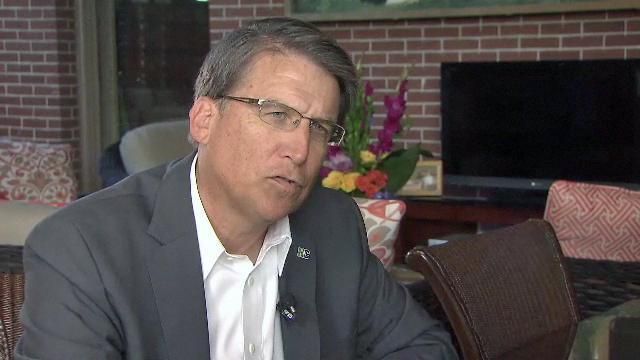McCrory says he'll sign NC budget deal
Gov. Pat McCrory said Thursday he will sign the North Carolina state budget bill negotiated by fellow Republicans at the legislature this summer when it reaches his desk.
Posted — Updated"For the third straight year, we’ve gotten about 90 percent of the common sense solutions we’re recommending past by the legislature. Because of that, I will sign it," McCrory told reporters. "We got almost everything we wanted with a few disagreements, and it would be foolish of me and wrong of me as governor to shut down government and close our schools over a few disagreements in a $21 billion budget."
His announcement came hours before the House was expected to debate and hold the first of two required votes on the compromise agreement with the Senate. Senators voted for the spending plan Tuesday and Wednesday, with three Democrats joining the Republicans in backing the bill.
McCrory told The Associated Press last weekend he had concerns about provisions that would expand the number of transactions subject to sales tax.
"The one tax plan I disagreed with was the tax on automobiles and services," he said. “I would have preferred that not be in the budget, but it was a vast improvement over the original proposal, which would have been a hidden property tax on local governments throughout North Carolina. Had that been in there, I would have vetoed this bill."
The Senate originally wanted to shift how sales tax revenue is distributed statewide, sending more to rural counties instead of letting it stay in the urban areas where people shop. The final budget merely adds sales tax to services linked to product purchases, such as repairs, installation and warranties, and sends that revenue primarily to small and rural counties.
House Republican leaders also received encouragement that they could pass a budget late Wednesday when 21 representatives from the GOP's far conservative wing announced they would vote for the measure. Several of them had voted "no" on the House's original budget proposal in May.
In a release, they cited tax cuts, funds for teacher assistants and roads and a "considerable reduction in special interest spending outside of the role of government."
The plan spends $21.7 billion annually through mid-2017.
A veto would have led to a showdown with the Republican legislature, which has already passed three temporary spending measures since the budget was unfinished by the beginning of the fiscal year July 1. The third stopgap law expires Friday night. A veto could have forced lawmakers to approve a fourth "continuing resolution" or leave state government without fiscal directions to operate.
McCrory said he and his staff spent recent weeks trying to get House and Senate negotiators to reach a compromise.
"I think the major part that I played in this was just to get the conversation going again and get them out of the corners and kind of put down the barriers of stubbornness," he said. "I said, 'We’re one of only four states that has yet to complete the budget. This is unacceptable.' And they knew it, and they wanted to find common sense solutions.”
The governor said he would like a constitutional amendment requiring lawmakers to adjourn by June 30, regardless of whether they have passed a budget.
"I would strongly recommend to the legislature that you have a set deadline," he said, noting that the continuing resolutions state government has operated under for the past two months create "a sense of uncertainty" for schools and businesses statewide. "The system needs to change for the 21st century, and I’m going to recommend they work out maybe even constitutional amendments to make sure that, when we mean we have a part-time legislature, we really have a part-time legislature.”
• Credits
Copyright 2024 by WRAL.com and the Associated Press. All rights reserved. This material may not be published, broadcast, rewritten or redistributed.






